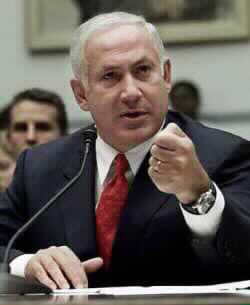Netanyahu Could Become Israeli Foreign Minister
01/11/2002| IslamWeb

JERUSALEM (Reuters) - Israeli Prime Minister Ariel Sharon planned on Friday to ask his main rival in the right-wing Likud party, Benjamin Netanyahu , to become foreign minister in the narrow government he hopes to form, Israel Radio said.
Spokesmen for the two men declined to comment on the report, which said Sharon and Netanyahu, a hawkish former prime minister who advocates a harder line against a two-year-old Palestinian uprising, would meet later in the day at Sharon's ranch.
Netanyahu, 53, popularly known as "Bibi," has said he would challenge Sharon in the as-yet-unscheduled Likud leadership election, an aspiration that could make it difficult for him to accept the post.
Agreement to accept Sharon's offer could depend on the two men reaching a deal on Netanyahu's future political moves.
Cabinet minister Danny Naveh said Sharon would begin formal talks on Sunday with prospective partners in a narrow government following the collapse of his broad coalition on Wednesday, when the Labor Party bolted over funding for Jewish settlements.
Ultranationalists who oppose trading occupied land for peace and support unlimited Jewish settlement on territory Israel seized in the 1967 Middle East war are among those Sharon will be courting.
But Naveh, a Likud member, voiced confidence a new government would respect President Bush's desire for Israeli moderation as Washington prepares for possible war to oust Iraqi leader Saddam Hussein .
"I think that at the end of the day, this kind of (right-wing) government can cope with these (U.S.) demands," Naveh, minister for parliamentary affairs, told Occupation army Radio.
MESSAGE TO U.S.
Israel's Yedioth Ahronoth newspaper reported that Sharon sent a message to Washington saying any government he formed would remain committed to Bush's Middle East peace vision, which includes the creation of a Palestinian state.
Palestinians have expressed alarm at Sharon's offer of the defense portfolio to former occupation army chief Shaul Mofaz, who has advocated expelling Palestinian President Yasser Arafat .
A rightward lurch in Israel could hinder international efforts to coax it and the Palestinians into defusing violence as well as U.S. attempts to get Arab support on Iraq.
Asked if Sharon would put together a government that would follow "extremist" guidelines, Naveh replied: "Absolutely not."
Naveh said any differences with potential far-right coalition partners over peace with the Palestinians could be put on the back burner in what he called the current lack of a real peace process.
Sharon, riding high in opinion polls, has vowed to go on leading the country, suggesting he wants to avoid early elections and a challenge by Netanyahu, prime minister from 1996 to 1999, for the Likud leadership.
Netanyahu has at times sniped at Sharon from the sidelines, urging the government to expel Arafat despite U.S. opposition.
With only 55 seats in the 120-member parliament now under Sharon's control, political commentators believe he will have to hold an election should his coalition-building fail.
Sharon, who took office 19 months ago and forged a "national unity" government with center-left Labor, has already put out feelers to the far-right Yisrael Beitenu party. Its seven parliamentary seats could restore his legislative majority.
Defense Minister Binyamin Ben-Eliezer tendered his resignation on Wednesday along with other Labor ministers, including dovish Foreign Minister Shimon Peres.
Israeli media said Mofaz, a lieutenant-general, had yet to formally accept. The appointment must be approved by the government and then parliament, probably over the next week.
The dour Mofaz reshaped Israel's battle against the uprising into a controversial "war on terror." He accused the Palestinian leadership of "being infected from head to toe with terror."
Palestinians and human-rights groups say Mofaz committed war crimes during his tenure, including "assassinations" of dozens of Palestinian resistance men in operations that also killed dozens of civilians, and crippling blockades of Palestinian cities to stop resistance bombers slipping into Israel for attacks.
At least 1,640 Palestinians and 623 Israelis have been killed since the uprising began in September 2000.
BEN-ELIEZER TRAILS IN LABOUR LEADERSHIP RACE
The government crisis was precipitated by Ben-Eliezer's demands to reallocate funds earmarked for Jewish settlements in the West Bank and Gaza to Israel's poor and the elderly at a time of serious economic downturn caused by the violence.
The international community regards the settlements as illegal. Israel disputes this.
Critics accused Ben-Eliezer of using the settlements issue to improve his standing against dovish challengers in a November 19 party leadership election. He has denied the allegation.
An opinion poll in Yedioth Ahronoth on Friday found that Ben-Eliezer's popularity among Labor members surveyed after he quit the government had risen from 22 percent to 30 percent.
But the front-runner in the leadership race, former general Amram Mitzna, was backed by 41 percent of those polled.
PHOTO CAPTION
Israeli Prime Minister Ariel Sharon planned November 1, 2002 to ask his main rival in the right-wing Likud party, Benjamin Netanyahu , to become foreign minister in the narrow government he hopes to form, Israel Radio said. Netanyahu listens to a question from the House Committee on Government Reform on Capitol Hill, September 12, 2002. (William Philpott/Reuters)
www.islamweb.net
